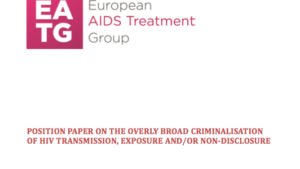Overview
Estonia does not have an HIV specific law but Articles 118 and 119 of the Criminal Code have been used to prosecute the non-disclosure, exposure and transmission of HIV.
There have been at least six HIV criminalisation cases in Estonia, half of which were reported prior to 2007. In 2017, a man was sentenced to three and a half years’ in jail for alleged HIV transmission to two women: the case was sensationalised by the media who published his name and his photo.
With the support of HIV JUSTICE WORLDWIDE, the Estonian Network of Positive People and the East Europe and Central Asia Union of PLHIV (ECUO) attempted to bring the case to the European Court of Human Rights (ECHR) in November 2018 on the grounds that HIV was now a chronic, manageable disease and could no longer be classified as a danger to life. The submission also argued that the applicant could not have foreseen that having unprotected sex would mean criminal liability. However, the ECHR refused to hear the case.
In 2023 a prisoner living with HIV was sentenced to an additional two and a half years’ imprisonment for alleged threats and violence. Among these alleged acts, the man allegedly poured urine on a prison guard in an apparent attempt to transmit HIV to the officer. Despite this not being a route of transmission, the man was found guilty of ‘threatening, using violence against a representative of authority and attempting to inflict grievous bodily harm’, although it is not clear under which provision.
In another case reported in 2023, a woman who moved to Estonia after fleeing Russia’s invasion of Ukraine was convicted for attempting to cause serious bodily harm. The case arose after the woman, who was living with HIV, allegedly had unprotected sex with a man on two occasions without disclosing her status. Following her arrest in the summer of 2022, it became clear that she had not been taking her medication and had not regularly been seeing a doctor, meaning that her viral load became high. Following her conviction in October 2023, she received a reduced sentence of eight months suspended.
Laws
Penitentiary Code of Estonia
Section 118. Serious Bodily Harm:
Part 1. Damage to health resulting in:
1) Danger to life;
2) a health disorder that lasts at least four months and associated with a permanent disability of at least 40 percent of full working capacity;
3) severe mental disorder;
4) termination of pregnancy;
5) incurable damage, significantly disfiguring a person;
6) loss of an organ or its functioning;
7) death, – – shall be punishable by imprisonment for a term of four to twelve years.
Part 2. An act covered in this section, committed by a legal entity, – is punishable by a monetary penalty
[RT I, 07/12/2014, 1 – entry into force 01.01.2015]
Section 119. Serious bodily harm through negligence.
(1) Infliction of grievous bodily harm through negligence – shall be punishable by monetary recovery or imprisonment for up to one year.
(2) The same act, entailing infliction of grievous harm to the health of two or more people, –
the applicable sentence is up to three years in prison.
[RT I 2006, 31, 233 – entry into force 16.07.2006]
(3) An act provided for in subsection (1) or (2) of this section, committed by a legal person – shall be punished by a monetary penalty.
[RT I, 12/23/2014, 14 – entry into force 01/01/2015]
Acknowledgements
Authors: Eurasian Women’s Network on AIDS (EWNA)
Regional HIV criminalisation report that summarises the state of play regarding HIV criminalisation laws and known prosecutions in the EECA region.
HIV Justice Network's Positive Destinations
Visit the Estonia page on Positive Destinations for information on regulations that restrict entry, stay, and residency based on HIV-positive status, as well as access to HIV treatment for non-nationals.




